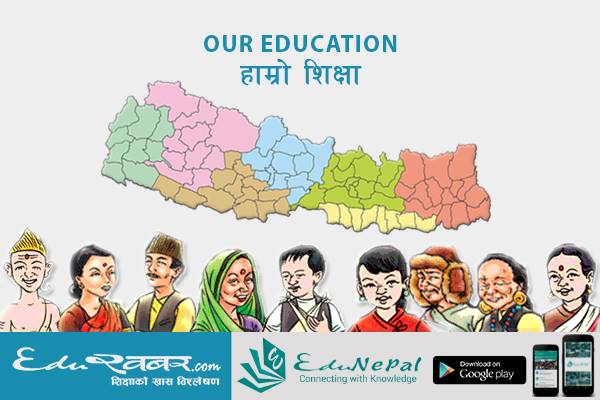
Makawanpur - The new constitution transferred the authority to oversee education up to the secondary school level to local bodies however there are serious doubts over its effective implementation. Many experts opine that serious preparation is yet to be made to ensure a smooth transition of management of school from the government entities to the local bodies.
Rajendra Simkhada, a guardian, in the town of Hetauda says “There is no debate on how will the local bodies ensure quality education, how will they provide benefits for teachers and manage them, how will they ensure uniformity in examinations and results across the country.”Simkhada argues that teachers are highly politicised therefore there are fears that the elected representatives would back up teachers belonging to their party lines and discriminate those from rival political groups. He says both students and their parents would suffer in such situations.
Simkhada says the government should formulate clear policy on framework for evaluating examinations. He says there would be serious complication if one local body disapproves examination conducted by another local body. He recommends that parents, students, teachers, officials from education department and newly elected local bodies should start a dialogue to address these concerns. If guardians don’t take initiative for such a meaningful dialogue, he warns that the education would fall into jeopardy.
Rishiram Pokharel, the Principal of Adhunik Rastriya Secondary School, is cautiously optimistic. He says it is positive that local bodies have now power to look into education but there should be a clear roadmap on how they can exercise this power. He argues that there is no clear roadmap on how they deal into administrative issues including appointment, promotion and benefits for teachers. He is hopeful that the local bodies will make correct evaluations, ensure transparency in career development decisions, guarantee sufficient positions of teachers in schools and address problems faced by teachers working under different schemes.
Former principal and the chairperson of ward number 6 of the Hetauda Sub Metropolitan City Arjun Prasad Chaulagain says the delay in bringing new education regulation would further complicate the situation. He says it is not possible for the local government to directly introduce regulation related to education. He urges the central government to pave way and provide adequate resources and decision making rights to local bodies regarding issues related to education up to the secondary school levels.
Janga Bahadur BK, the Chairperson of the Rastirya Adhunik Secondary School, says community schools have failed to flourish because Singhadurbar so far allocated resources based on connection rather than merit. He says the government should have different approach to look into schools with 400 students and schools with 2,000 students. “As long as the state viewed all schools in a similar manner, there was difficulty in decision making. Students have financial and physical problems. With more power now in local bodies, I am hopeful that there will be good results.”
Experts say the local governments will be more aware about the strength and weakness of public schools and thus they can take decisions on need basis and play a major role in school reforms. Under the existing framework, the district education officer and the school inspectors were overseeing the schools. Some note that the two officials often had hierarchy dispute and they could not deliver effectively.
Devnarayan Chaudhary, a school inspector, says the local bodies can find problem in managing the teachers. He says they might be even forced to start work from the zero level.
District Education Officer Birendrajung Thapa says some problems might erupt until officials related to education are designated at the local bodies. It is still unclear what will be the role of the district education office. He says that the local bodies might form social consultation committee.
Currently there are 516 schools in Makawanpur district and there are 2,702 teachers paid by the government. There are five regional school inspectors and 18 source centres. District Education officer Thapa says the quality of education could improve if officials from the education office are deployed in the local bodies. “Instead of monitoring from districts, it is obvious that oversight from the concerned local bodies will enhance the quality of education,” he adds
In the past, programmes at public schools used to depend upon district, regional office and central department overseeing education. Mayor of the Hetauda Sub Metropolitan City Haribahadur Mahat says it is a challenge for local bodies to ensure quality education.“We have got the legal powers but it is still not clear how are we going to implement them. Government and donors both are massively investing on public education but we have still not been able to impart quality education. Our foundations are poor therefore we must create a tangible change in our educational foundation.”He says his office would focus on technical and productive education. He said old curriculum would be amended to encourage technical and productive educational system.
What do students say ?
The new constitution has empowered local bodies when it comes to exercising authority related to public education. We tried to seek the view of the students on the new provision.
Of the eight students of grade 10 selected randomly, only one said he knew about the new provision. Seven others said that they felt that secondary schools were under local bodies means students from dalits and marginalised comunities and students with physically disabilities would get more scholarship. All of these students were from the Adhunik Rastriya Secondary School which has given best results in Makawanpur district for the last 13 years.
(This stories the part of a radio programme entitled 'Hamro Sikshya' which discusses the opportunities and challenges in public education in the new federal setup. The programme is produced by edukhabar.com with the support of Action Aid Nepal. It is aired from Radio Dhangadhi, Kailali, Radio Doti based in Doti and Radio Taha Sanchar based in Kathmandu. The radio programme can also be tuned through this link: Hamro Sikshya and also through aneroid app Edunepal.)
प्रतिक्रिया